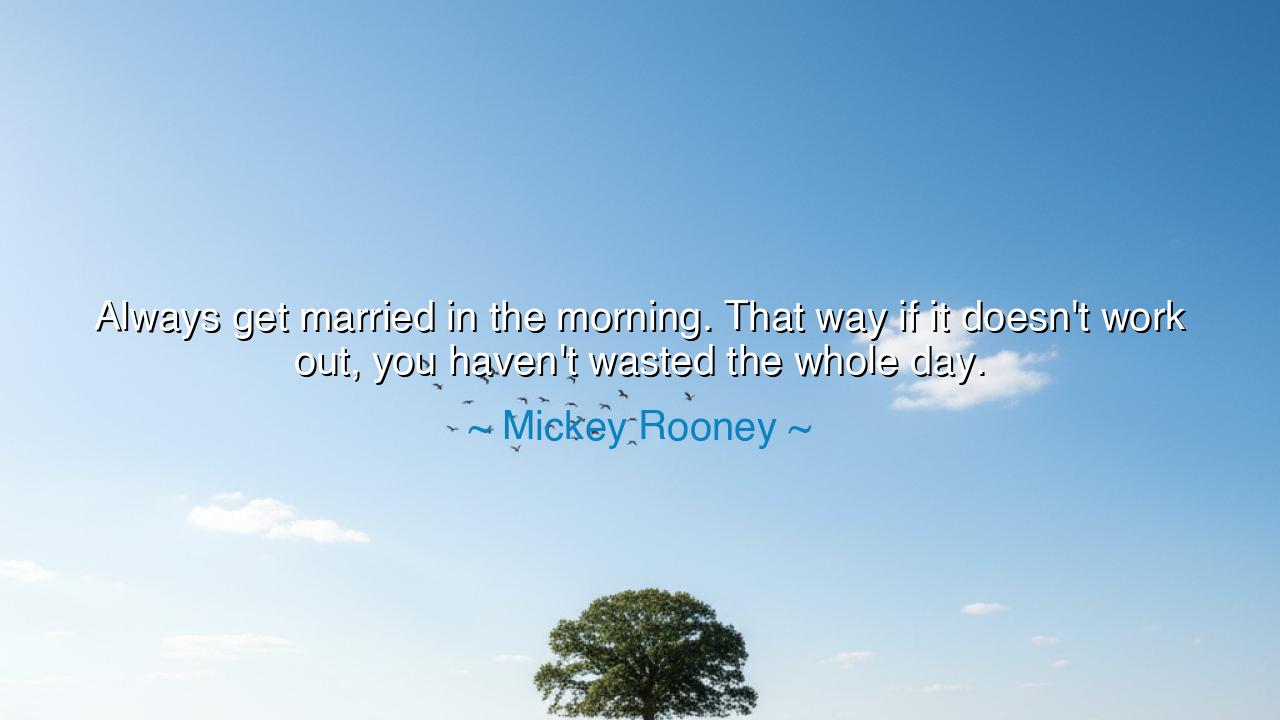
Always get married in the morning. That way if it doesn't work
Always get married in the morning. That way if it doesn't work out, you haven't wasted the whole day.






Hear, O wanderers in the land of love and folly, the words of Mickey Rooney, a man of laughter and sorrow, who once said: “Always get married in the morning. That way if it doesn’t work out, you haven’t wasted the whole day.” Though it springs from humor, this saying holds the strange wisdom of one who has walked many paths of the heart. Beneath its jest lies the bittersweet truth of human love—its joy, its frailty, and its endless hope for renewal.
In these words, the ancient spirit of irony speaks. For Rooney, who married eight times, knew much of the fleeting nature of affection and the unpredictable winds of passion. The laughter within the quote is not mockery but understanding. To marry in the morning is to act with the courage of optimism; to not waste the whole day is to accept that not all things last. There is both wit and wisdom here: a reminder that love, like the dawn, is beautiful but fragile, and that one must greet it with joy yet hold it lightly.
In the days of old, jesters were the truth-tellers of kings. Their humor revealed what pride concealed. So too does Rooney, through jest, unveil a truth about the human heart. The ancient poets taught that love is both a flame and a mirror—it warms, it burns, and it shows us who we are. Many enter marriage as though it were a fortress, thinking to guard happiness forever. Yet Mickey, with his laughter, reminds us that love is not possession but presence, not a promise of forever but a moment to be cherished, honest and alive.
Think of the tale of Elizabeth Taylor, whose life, like Rooney’s, was marked by beauty, passion, and many unions. Each marriage began with hope’s bright sunrise, and though some ended swiftly, she never ceased to believe in love. Her courage to begin again, to seek meaning even after heartbreak, mirrors the spirit of Rooney’s quote. For what is life if not a series of mornings—each one a new chance to love, to err, to learn, and to laugh at one’s own folly?
There is a deeper rhythm in Rooney’s humor. To laugh at love’s impermanence is not to despise it, but to understand it. The wise know that all human bonds are fragile; yet that fragility gives them their sweetness. When we recognize that the day may end, we cherish the morning more fully. To not waste the whole day is to rise again after loss, to find wisdom in disappointment, and to live without bitterness. Thus, even in jest, Rooney teaches the art of resilience—the noble skill of turning heartache into humor, and regret into reflection.
From this teaching flows a lesson for the generations. Enter love with open eyes, yet open heart. Do not demand perfection, for even the morning sun casts shadows. When love falters, do not curse it; instead, give thanks for the light it once gave. And when you stumble, rise again. For laughter, born from pain, is a healer of souls. As Rooney’s own life shows, it is better to laugh at love’s mischief than to grow bitter at its impermanence.
So, dear listener, carry this wisdom gently: love bravely, lose lightly, and laugh deeply. For to love at all is to risk the fall—but to fear the fall is never to fly. If your morning brings joy, embrace it; if it brings loss, let it pass with grace. In either, you have not wasted the day—you have lived it. And that, as Mickey Rooney well knew, is the truest victory of the heart.






AAdministratorAdministrator
Welcome, honored guests. Please leave a comment, we will respond soon